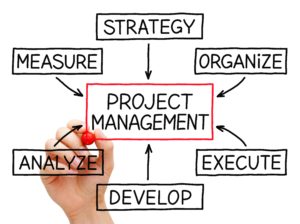Project management can be tough work. In so many cases, you hold the keys. You know every detail of your program. And your colleagues look to you for guidance and leadership. But what does it mean to be an effective project manager? With so many factors beyond your control, there’s a few crucial strategies you need to master to assure that your project ends on time, and on budget. I highlight five below.
1. Setting Clear Objectives: Every project should have clear objectives and goals that everyone has agreed on.
2. Creating Flexible Dates: When you’re building your budget and timeframe, be sure that you build in a reasonable amount of flexibility for your project. You must be able to expect the unexpected, and give yourself some time to adjust timeframes and schedules, so you can assure the project gets completed on time.
3. Accepting You’re Not In Control: One of the problems with project management is that for some projects, the amount you actually control is limited. Your job might actually be to make the right connections, articulate needs and hope that team members follow through with deliverables.
4. Communicating With Your Team: Proper communication is essential. And it’s not just when there is a problem. It’s designing an appropriate number of meetings, checkins and status updates for the team. This really means honing in on your leadership skills, not scheduling frivolous meetings that micro-manage the team and are not productive uses of people time.
5. Crafting a Budget: If you’re operating on a project that has a tight budget, always know the ins and outs of the budget. This information is valuable so you can plan accordingly, monitor costs and make the appropriate decisions to stay within budget. If you aren’t tracking hours, time and costs in a way that suits the project needs – reconsider your approach.
But the key for effective project management is understanding that these five themes are related. So if you know that a date will shift, it’s communicated clearly to your team – explaining the factors that lead to the decision, and why.


